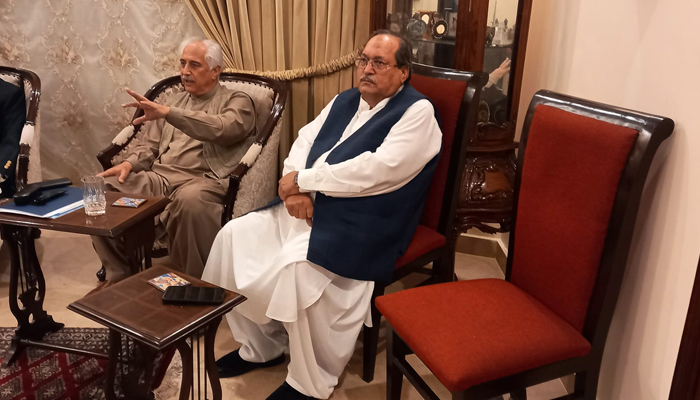KP has suffered shocks over decades: think tank
PESHAWAR: The participants in a meeting of a think tank here on Monday said that Khyber Pakhtunkhwa suffered a series of external and internal shocks over the last few decades.
Former secretary Home and Tribal Affairs Dr Syed Akhtar Ali Shah chaired the meeting of the National Think Tank.
In his introductory remarks, the chairman of the think tank said that their basic aim was to highlight issues of governance, conduct their analysis and make suggestions for possible solutions.
Former Adviser to the Chief Minister on Finance Himayatullah Khan made a presentation on natural resources and economic crisis of Khyber Pakhtunkhwa.
Engr. Gul Bahadar Khan, Dr Muhammad Nawaz, Associate Professor IMSiences, Dr Amir Raza, Asst Professor Political Science Department, University of Peshawar, Peshawar Press Club President Arshad Aziz Malik, Engr. Sher Aman, Arif Khan, Dr Jehan Zeb Khalil and others attended the meeting.
Himayatullah said that Khyber Pakhtunkhwa faced a host of challenges over the last few decades that included the fallout from over four decades of the Afghan conflict, spillover of militancy from ex-FATA which badly shattered the social fabric of the province and led to internal displacement of three million people.
He said that the damage inflicted by the earthquake in 2005 and heavy floods in 2010 also played havoc with the infrastructure in Khyber Pakhtunkhwa.
He said that all these events had severe economic and social implications for the province. The speaker added that the pace of economic development, especially industrialization remained stagnant in Khyber Pakhtunkhwa primarily due to inherent locational disadvantage. To deal with this unwholesome scenario, he maintained that a focused and coordinated approach based on the framework of the 1973 Constitution was required.
Himayatullah was of the view that the implementation of the Constitution in letter and spirit can greatly help KP and its people.
He said the 1973 Constitution established an order based on the collective will of the people of Pakistan through their chosen representatives and enjoys widespread public legitimacy. The Constitution, he said, addressed fundamental issues such as the federal structure of the state, the quantum of autonomy of the federating units and their rights within the federation.
It prescribes an arrangement whereby a certain role has been assigned as the exclusive domain of the federation, a role of the federating units, and a role which neither falls under the exclusive domain of the federation or the federating units but which falls under the joint jurisdiction of both and is regulated through special provisions in the constitution.
Himayatullah expressed concern over the undeveloped tribal region which was being deprived of its rights. He said that Article 160(1) provided for a National Finance Commission (NFC) which will make recommendations pertaining to distribution of revenues between the federation and the provinces.
He said that currently the share of Khyber Pakhtunkhwa in national revenues had reduced from 15.5 percent in 1970 to 14.6 percent. The speaker said that merger of FATA placed additional responsibilities on KP but without commensurate revision in the share of the province.
-
 Catherine O’Hara’s Cause Of Death Finally Revealed
Catherine O’Hara’s Cause Of Death Finally Revealed -
 Swimmers Gather At Argentina’s Mar Chiquita For World Record Attempt
Swimmers Gather At Argentina’s Mar Chiquita For World Record Attempt -
 Brooklyn Beckham, Nicola New Move Could Leave David, Victoria Reeling
Brooklyn Beckham, Nicola New Move Could Leave David, Victoria Reeling -
 Anthropic Criticises ChatGPT Ads As OpenAI Begins Testing Advertising In AI Chats
Anthropic Criticises ChatGPT Ads As OpenAI Begins Testing Advertising In AI Chats -
 YouTube Star MrBeast Acquires Step: Redefining Finance For Gen Zs
YouTube Star MrBeast Acquires Step: Redefining Finance For Gen Zs -
 Sarah Ferguson Plans Big Move To Cause ‘serious Damage’ To Andrew
Sarah Ferguson Plans Big Move To Cause ‘serious Damage’ To Andrew -
 Trump Nears 500 Press Interactions In His Second Term, Surpassing Former President Biden
Trump Nears 500 Press Interactions In His Second Term, Surpassing Former President Biden -
 Hailee Steinfeld Reveals Her Plans To Return To Music
Hailee Steinfeld Reveals Her Plans To Return To Music -
 Elon Musk Unveils SpaceX Plan For Civilian Moon, Mars Trips
Elon Musk Unveils SpaceX Plan For Civilian Moon, Mars Trips -
 MTG Commander Banned Update: Wizards Frees Infamous Instant-win Card
MTG Commander Banned Update: Wizards Frees Infamous Instant-win Card -
 Royal Family Braces For ‘final Blow’ As Andrew Scandal Deepens
Royal Family Braces For ‘final Blow’ As Andrew Scandal Deepens -
 Snow Forecast Warns Of Reduced Visibility And Travel Risks In Ontario
Snow Forecast Warns Of Reduced Visibility And Travel Risks In Ontario -
 Margot Robbie Reveals 'worst' Gift She Received From Co-star
Margot Robbie Reveals 'worst' Gift She Received From Co-star -
 Casey Wasserman Says He ‘deeply Regrets’ Ghislaine Maxwell Emails After DOJ File Release
Casey Wasserman Says He ‘deeply Regrets’ Ghislaine Maxwell Emails After DOJ File Release -
 Discord Face Scan Age Verification Rules Explained As Platform Tightens Access
Discord Face Scan Age Verification Rules Explained As Platform Tightens Access -
 Cavaliers Vs Nuggets Showdown Heats Up After Blockbuster Trade
Cavaliers Vs Nuggets Showdown Heats Up After Blockbuster Trade




